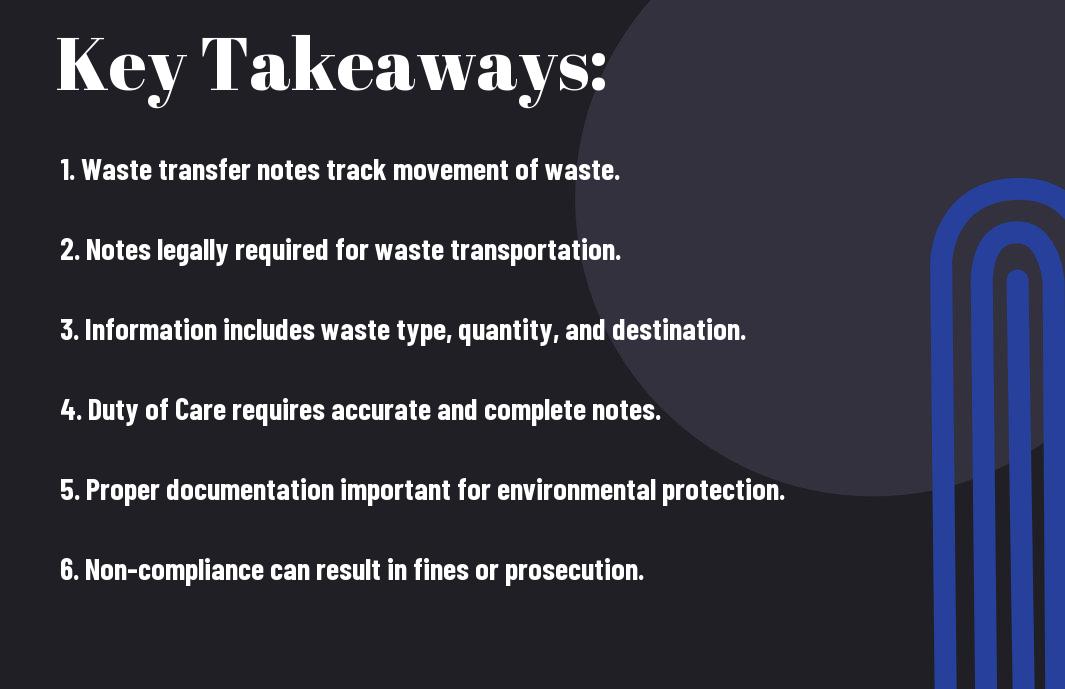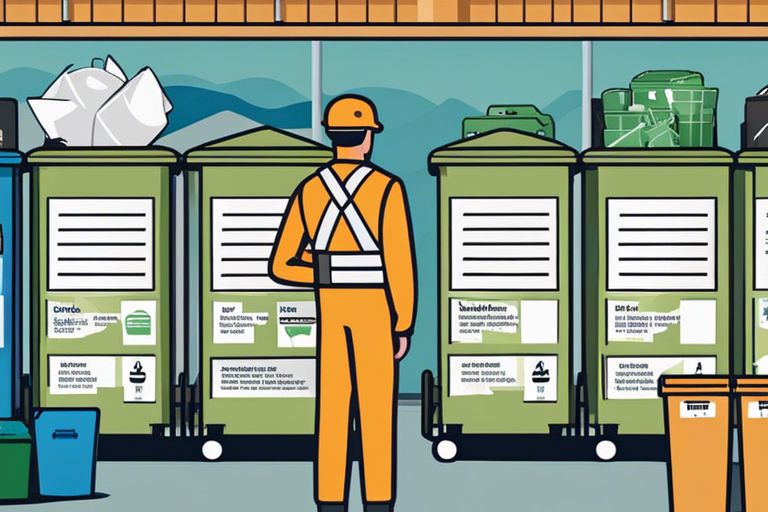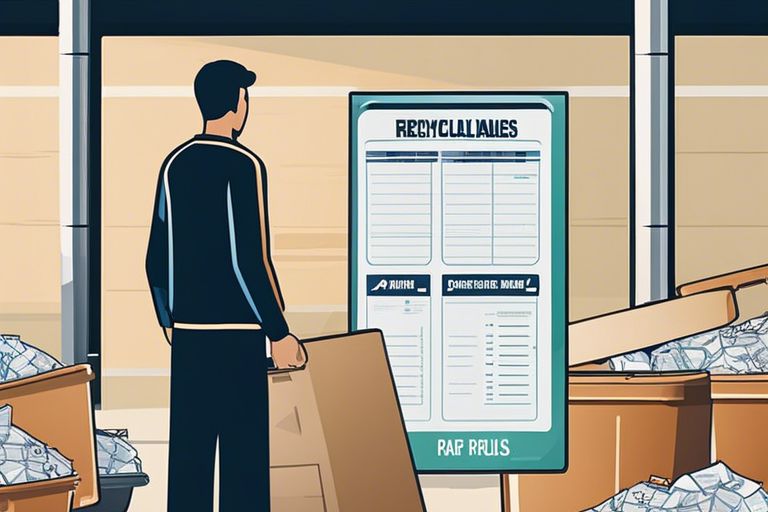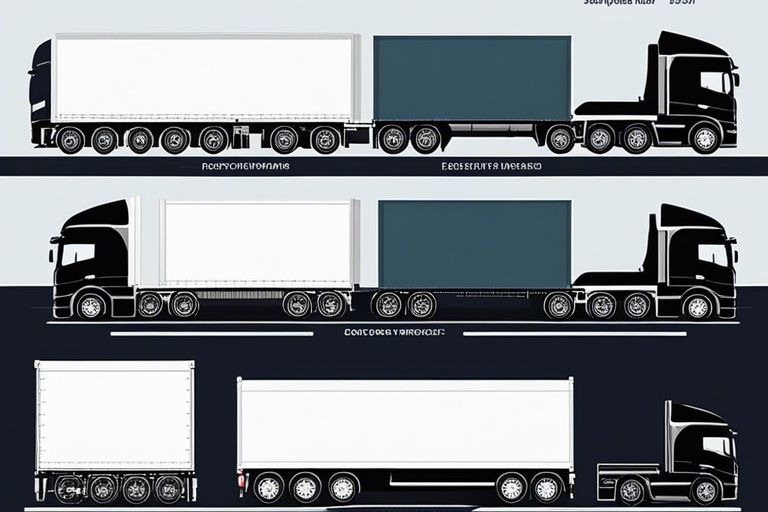Welcome to our informative blog post where we will delve into the complex world of UK waste transfer notes. For those new to the industry, understanding the legalities and requirements of waste transfer notes can be overwhelming. However, it is crucial for businesses and individuals involved in the transfer of waste to be knowledgeable about these documents to ensure compliance with the law. In this post, we will cover the important details you need to know about waste transfer notes, including their purpose, contents, and legal obligations. We will also highlight the potential risks and consequences of not adhering to waste transfer note regulations, as well as the positive impact of proper waste management. By the end of this post, you will have a comprehensive understanding of UK waste transfer notes, allowing you to navigate the waste management process with confidence and legal certainty.
Key Takeaways:
- Waste Transfer Notes: These are important documents used to track the transfer of waste from one party to another and ensure proper disposal or recycling.
- Legal Requirement: It is a legal requirement for businesses in the UK to use Waste Transfer Notes when transporting waste, failure to do so can result in fines and penalties.
- Contents of the Notes: The Waste Transfer Notes should include details of the waste, the parties involved, and the method of disposal, providing a clear record of the waste’s journey.

Understanding Waste Transfer Notes
Definition and Importance
Waste Transfer Notes (WTNs) are legal documents that detail the transfer of waste from one party to another. They are important as they track the movement of waste from its place of origin to its final destination, ensuring that it is handled and disposed of properly.
WTNs also serve as a crucial record-keeping tool, providing evidence that waste has been transferred and handled in compliance with the law. This documentation is essential for demonstrating compliance with waste regulations and for holding parties accountable for their waste management practices.
Legal Requirements in the UK
Under the Environmental Protection Act 1990, anyone involved in the transportation of waste is legally required to complete and retain a WTN for each transfer of controlled waste. This applies to waste producers, carriers, and waste facilities. Failure to comply with this legal requirement can result in hefty fines and legal repercussions.
Additionally, the Duty of Care regulations emphasise the responsibility of waste producers to ensure that their waste is transferred only to authorized carriers and facilities. This places a legal obligation on all parties involved in the waste transfer process to handle and dispose of waste in a manner that does not cause harm to human health or the environment.

Components of a Waste Transfer Note
When it comes to waste management, understanding the components of a Waste Transfer Note is essential for businesses. A Waste Transfer Note is a crucial document used to track the transfer of waste from one party to another, ensuring that waste is handled and disposed of responsibly. To learn more about Waste Transfer Notes, you can visit the official government website Dispose of business or commercial waste: Waste transfer notes.
Essential Information
The first component of a Waste Transfer Note is the essential information that must be included in the document. This includes details such as the description and quantity of the waste, the date of transfer, the name and address of both the transferor and the transferee, and the relevant waste codes. It is crucial for businesses to ensure that all essential information is accurately recorded on the Waste Transfer Note.
Furthermore, businesses must retain a copy of the Waste Transfer Note for at least two years, and be able to present it to the Environment Agency upon request. Failure to comply with these regulations can result in severe penalties for businesses.
Additional Details and Considerations
In addition to essential information, there are various additional details and considerations that businesses should be aware of when completing a Waste Transfer Note. This may include information about the nature of the waste, any special handling requirements, and details of the disposal or treatment site. It is essential for businesses to consider these additional details to ensure that the waste is managed and disposed of appropriately.
Businesses should also consider any specific regulations or requirements that may apply to their particular industry or type of waste. Consulting with a waste management expert or legal advisor can provide businesses with valuable guidance in navigating these considerations.
In the process of completing a Waste Transfer Note, businesses must ensure that all necessary steps are taken to accurately record and manage their waste transfer activities. This involves careful attention to detail and thorough understanding of the waste management regulations.
Creating and Managing Waste Transfer Notes
When it comes to managing waste transfer notes, it’s essential to understand the legal obligations and best practices. These records are crucial for demonstrating compliance with waste regulations and help to ensure that waste is managed responsibly. For a detailed explanation of Waste Transfer Duty of Care Notes, you can refer to Waste Transfer Duty of Care Notes Explained.
Step-by-Step Process
Creating and managing waste transfer notes involves a step-by-step process to ensure proper documentation and compliance. The following table outlines the key steps:
| Step | Description |
| 1 | Identify the waste producer and the recipient |
| 2 | Accurately describe the waste being transferred |
| 3 | Complete and sign the waste transfer note |
Best Practices for Compliance
To ensure compliance with waste transfer regulations, it’s important to follow best practices. This includes:
| Practice | Description |
| 1 | Regularly audit and review waste transfer processes |
| 2 | Provide training to staff involved in waste management |
| 3 | Maintain accurate records of waste transfers |
It’s vital to adhere to these best practices to ensure compliance with waste regulations and to minimise the risk of environmental harm from improper waste management.

Challenges and Common Mistakes
When it comes to UK Waste Transfer Notes, there are several challenges and common mistakes that beginners need to be aware of. These can range from inadequate record-keeping to improper waste identification, which can lead to serious consequences.
Avoiding Penalties and Fines
One of the most important aspects of handling waste transfer notes is to ensure that all the information is accurate and up to date. Failure to do so can result in penalties and fines from the Environment Agency. It is crucial for beginners to familiarise themselves with the legal requirements and to double-check all details before completing and filing a waste transfer note.
Furthermore, it is essential to have a clear understanding of the different types of waste and their respective codes. Incorrectly categorising waste can lead to serious legal repercussions, so it is vital to seek expert guidance if there is any uncertainty.
Myth-busting and Clarifications
There are several myths and misconceptions surrounding waste transfer notes, which can often lead to confusion for beginners. It is important to clarify these misunderstandings in order to ensure compliance and avoid costly mistakes.
Some common myths include the belief that small businesses are exempt from waste transfer note requirements, or that electronic waste transfer notes are not valid. It is crucial to dispel these myths and ensure that all businesses understand their obligations when it comes to waste management and documentation.
For more in-depth information about the legal requirements and best practices for waste transfer notes, it is advisable to consult with a professional waste management company or legal expert. Seeking professional guidance can help businesses navigate the complexities of waste transfer notes and avoid potential pitfalls.
UK Waste Transfer Notes Explained for Beginners
In conclusion, understanding the UK Waste Transfer Notes is an essential part of managing waste in a responsible and compliant manner. The Duty of Care, Waste Transfer Notes, and Waste Definitions play a crucial role in ensuring that waste is properly handled, transported, and disposed of. By familiarising yourself with these important documents and definitions, you can effectively contribute to a healthier and more sustainable environment. For more detailed information on Duty of Care, Waste Transfer Notes, and Waste Definitions, please visit this link.
UK Waste Transfer Notes Explained for Beginners
Q: What is a waste transfer note (WTN)?
A: A waste transfer note is a legal document that must be completed whenever waste is transferred from one party to another. It provides details about the type and quantity of waste being transferred.
Q: Who needs to complete a waste transfer note?
A: Any business that produces, imports, carries, keeps, treats or disposes of controlled waste must complete a waste transfer note when transferring waste to another party.
Q: What information is required on a waste transfer note?
A: A waste transfer note must include details such as the type and description of the waste, the quantity of waste, the transferor and transferee’s details, the date of transfer, and the location of where the waste is being transferred to.
Q: Are there any exemptions from using waste transfer notes?
A: Some types of waste, such as agricultural waste and waste from households, are exempt from the requirement to complete a waste transfer note. However, it is important to check the regulations to ensure compliance.
Q: What are the penalties for not using waste transfer notes?
A: Failure to complete a waste transfer note when required can result in prosecution and fines. It is essential for businesses to understand their obligations and ensure compliance with waste transfer regulations.







